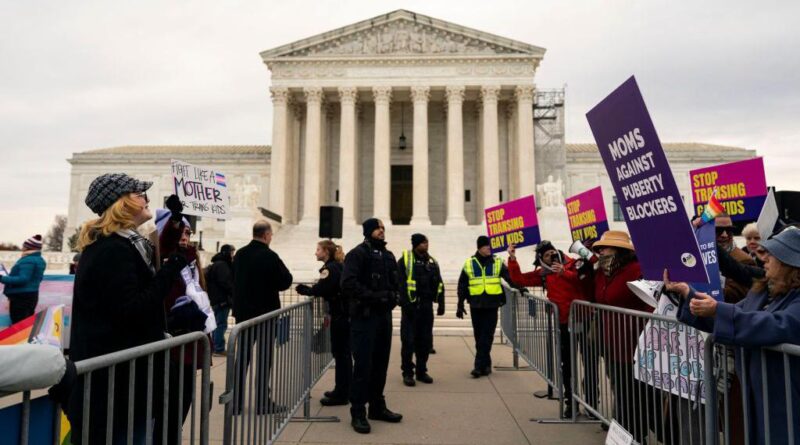Supreme Court Upholds Tennessee Ban on Gender Transition Treatments for Minors.
WASHINGTON In a landmark decision, the U.S. Supreme Court on Wednesday (June 18) upheld a Tennessee law that bans gender transition treatments for minors. The ruling marks a major victory for supporters of the state’s Senate Bill 1 (S.B.1), which prohibits doctors from prescribing puberty blockers, hormones, or performing surgeries aimed at gender transition in children.
The case, United States v. Skrmetti, stemmed from a challenge by three transgender teens and the Biden administration. They argued the law violated constitutional protections. Tennessee Attorney General Jonathan Skrmetti defended the law, and oral arguments took place in December 2024.
In a 6-3 decision, the Court ruled the law does not breach the Equal Protection Clause of the 14th Amendment. Writing for the majority, Chief Justice John Roberts said the law distinguishes based on age and treatment purpose not sex and is therefore subject only to a rational basis review.
S.B.1 does not block these treatments for other conditions in minors, nor does it affect adult access to gender-related care. As such, the majority rejected claims of sex-based discrimination. Justices Sonia Sotomayor, Ketanji Brown Jackson, and Elena Kagan dissented. The decision could shape ongoing legal battles in over two dozen states with similar laws under review.
Brent Leatherwood, president of the Ethics & Religious Liberty Commission (ERLC), welcomed the ruling. He called it a “landmark” for child protection.
“When a child needs to be protected, states have a right to step in with common-sense laws to save that child from harm,” Leatherwood said. “This aligns with a belief long held by Southern Baptists that safeguarding minors from harmful transgender procedures is a moral and legal responsibility.”
The ERLC had listed this case as its highest judicial priority this term. It submitted an amicus brief alongside the Tennessee Baptist Mission Board in support of the law.
ALSO READ: Lassa Fever Cases Rise In Nigeria as Death Toll Climbs to 143.
Randy Davis, president of the Mission Board, praised the ruling. “This is a monumental statement in favor of protecting our youth,” he said. “We are grateful for those in Tennessee leadership who stood up for children.”
At the 2025 SBC Annual Meeting, the ERLC hosted a discussion on the case featuring Attorney General Skrmetti and Alliance Defending Freedom executive Ryan Bangert.
“This is all about protecting kids,” Skrmetti said. “In an age of ideological confusion, the government has a duty to act when there’s risk to children.”
The Tennessee law, passed in 2023, required doctors to stop all gender transition procedures on minors by March 2024. Shortly after its passage, the ACLU, three transgender minors, and their parents sued, claiming the law infringed on parental rights and targeted transgender youth.
The U.S. Department of Justice joined the suit, arguing the federal government had a vested interest in preventing the law from being enforced.
Initially, a district court blocked parts of the law from taking effect. It upheld bans on hormone therapy and puberty blockers but allowed the ban on surgeries to stand, noting the plaintiffs had not sought surgical procedures. Tennessee appealed, and the Sixth Circuit allowed the law to take effect while the case moved forward.
The plaintiffs then appealed to the Supreme Court, which agreed last year to hear the case. Former Solicitor General Elizabeth Prelogar represented the Biden administration.
ALSO READ: Nigeria Plans Emergency Evacuation of its Citizens in Iran and Israel.
She argued the law unfairly targets one specific use of widely accepted medications. “SB1 singles out and bans one particular use,” she said. “In Tennessee, these medications can’t be prescribed to allow a minor to identify with a gender inconsistent with their biological sex.” Tennessee Solicitor General Matthew Rice countered that the law was not discriminatory. He said it sets medical standards based on safety concerns not identity.
“Lawmakers passed SB1 to protect minors from risky, unproven interventions,” Rice said. “The law doesn’t discriminate; it regulates medical use.”
He compared the issue to how morphine use for pain management is legal, but using it for assisted suicide is not. “The Equal Protection Clause doesn’t force states to ignore medical reality or impose one side’s opinion in a disputed debate,” he said.
The decision is part of a broader trend of religious liberty and parental rights cases expected from the High Court this summer. The ERLC remains engaged in several of them.
Content Credit: Dada Blessing
Image Credit: BBC.com




